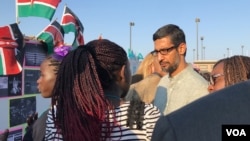Google’s workforce needs to “represent the world in totality,” said Sundar Pichai, Google’s chief executive, at an international girls coding competition held on the company’s campus here Thursday night.
His comments come as the search engine giant grapples with a high profile internal debate over the number and influence of its female employees. Last year, the company reported that women represent just 31 percent of Google's workforce and held 24 percent of leadership roles. Several initiatives are underway to boost those numbers, but those efforts are now a focus of some criticism.
On Monday, the company fired James Damore, a male engineer, who wrote about the role of women in tech and criticized the company’s efforts to bring more women into its workforce.
This week, the author of the memo filed a complaint with the National Labor Relations Board. The company canceled an employee town hall meeting because of online harassment prior to the meeting, according to reports.
But the coding competition, Technovation, provided an apt backdrop for Pichai’s comments.
With girls waving their country flags and pitching their products, Pichai appeared to address the controversy without speaking about it directly.
“I want you to know there’s a place for you in this industry,” Pichai said. “There’s a place for you at Google. Don’t let anyone tell you otherwise. You belong here, and we need you.”
The girls had competed for months – often teaching themselves to code – to make it to the final round in Mountain View, Calif. They learned how to test their products in the market and make their pitches in English.
Winners
A team from Kazakhstan won the senior round for their mobile app QamCare, which helps users keep track of each other in case of an emergency. They will receive $15,000.
Five runner-up senior teams from Kenya, Armenia, India and Kazakhstan will receive $10,000 each.
In the junior division, a team from Hong Kong won for Dementia Care Companion app. It uses games and cues to help people with dementia and their families stay connected. They will receive $10,000.
Runner-up teams from Cambodia, India, Canada and the U.S. will receive $5,000 each.
In the eight years of the competition, 15,000 girls from more than 100 nations have completed the program, said Tara Chklovski, founder and chief executive of Iridescent, the non-profit organization behind the event.
“The growing scale is exciting,” she said. “Many of these girls go on to win startup competitions, go to major in computer science. They get featured in national press. They get invited by heads of state.”




